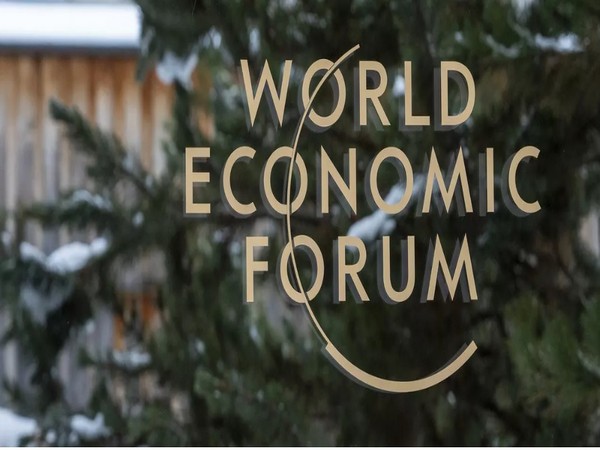Centre, ADB sign $50 mn loan to build water harvesting project in Meghalaya
The Indian government and the Asian Development Bank (ADB) on Thursday signed a $50 million loan to build a climate-adaptive water harvesting project in Meghalaya.
The World Economic Forum, supported by more than 45 partners, on Tuesday launched the Giving to Amplify Earth Action (GAEA), a global initiative to fund and grow new and existing public, private and philanthropic partnerships (PPPPs) to help unlock the $3 trillion of financing needed each year to reach net zero, reverse nature loss, and restore biodiversity by 2050.

[Photo:ANI]
The World Economic Forum, supported by more than 45 partners, on Tuesday launched the Giving to Amplify Earth Action (GAEA), a global initiative to fund and grow new and existing public, private and philanthropic partnerships (PPPPs) to help unlock the $3 trillion of financing needed each year to reach net zero, reverse nature loss, and restore biodiversity by 2050.
With the energy and cost of living crises, the ambition of steering the planet towards a 1.5-degree Celsius warming pathway hangs in the balance.
Advertisement
The recent agreement at the UN Biodiversity Conference (CBD COP15) in Montreal to conserve 30 per cent of all earth and sea looks bold but fragile in the face of a rising biodiversity crisis. Current funding is slow and inadequate, and a new approach is needed to get capital flowing.
Advertisement
Philanthropic giving can address this, with unique qualities not found in other financing: it is nimble, more tolerant of risks and is driven by values and long-term outcomes rather than quarterly returns.
“We are at a tipping point in our efforts to put the planet back on track to meet our climate ambitions. To reach the speed and scale required to heal the earth’s systems, we need to unlock not only private capital and government funds, but also the philanthropy sector as a truly catalytic force to achieve the necessary acceleration,” WEF Founder and Executive Chairman, Klaus Schwab said.
GAEA’s growing body of philanthropic partners includes: Active Philanthropy, the African Climate Foundation, Andre Hoffmann Family Office, the Arab Foundations Forum, Bezos Earth Fund, BMW Foundation, Children’s Investment Fund Foundation, the Clean Air Fund, Climate Leadership Initiative, ClimateWorks Foundation, Eleven Eleven Foundation, the Gordon and Betty Moore Foundation, Growald Climate Fund, IKEA Foundation, Laudes Foundation, Noa’s Ark Foundation, Open Society Foundations, the Patrick J. McGovern Foundation, Pearl Initiative, Philanthropy Asia Alliance (by Temasek Trust), Philea, The Rockefeller Foundation, Trottier Family Foundation, United Nations Foundation, the Wellcome Trust, WINGS, and Workday Foundation.
Individuals, academic institutions, companies and public sector organisations supporting the initiative include: Cambridge Institute for Sustainability Leadership, Capital for Climate, Carbon Direct, Center on Global Energy Policy at Columbia University, and Centre for Strategic Philanthropy at the University of Cambridge.
Philanthropic financing for climate mitigation has risen in recent years, but still represents less than two per cent of total philanthropic giving, estimated at $810 billion in 2021.
Greater philanthropic funding for climate and nature will support, not detract from, existing social priorities. As recently noted by Rajiv Shah, President, The Rockefeller Foundation: “Climate change poses a singular threat to humanityawe must directly confront climate change, even as we redouble efforts in our traditional program areas: health, power, food, and equity.”
Over the next 12 months, supported by McKinsey Sustainability as a knowledge partner, GAEA will work with founding members to build momentum.
GAEA will build on existing examples of success. For example, the Clean Cooling Collaborative, founded with the help of an initial $10 million of philanthropic funding in 2016, has mobilised more than $600 million in public and private finance to improve equitable access to low-carbon cooling and support 4.2 gigatons of avoided CO2 emissions by 2050.
Similarly, the government of the Seychelles has leveraged philanthropic funding, public loan guarantees and private investment to raise $15 million through a blue bond and convert $22 million of government debt into conservation funding to protect 13 marine areas, covering an area larger than Germany.
Wendy Abrams, Chief Executive Officer, Eleven Eleven Foundation, said: “We need more companies, family offices, individuals and the new generation of philanthropists to get involved in the climate and nature conversation. If we do not solve this together, there will be nothing to pass on to the next generation. GAEA can be a good platform to get all the right stakeholders and amplify action at scale.”
Advertisement